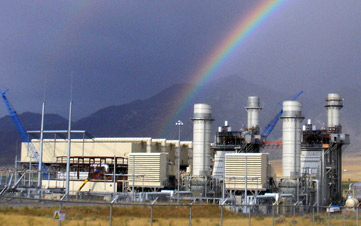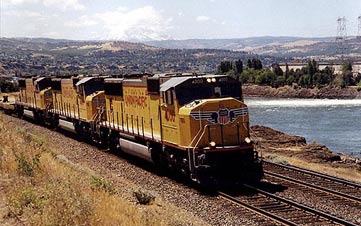9 Companies Poised to Ride the Energy Boom
Surging oil and gas production, particularly from shale basins that are just starting to deliver marketable fuel, may be better for ancillary companies servicing the oil giants than for the oil and gas companies themselves.


Profit and prosper with the best of Kiplinger's advice on investing, taxes, retirement, personal finance and much more. Delivered daily. Enter your email in the box and click Sign Me Up.
You are now subscribed
Your newsletter sign-up was successful
Want to add more newsletters?

Delivered daily
Kiplinger Today
Profit and prosper with the best of Kiplinger's advice on investing, taxes, retirement, personal finance and much more delivered daily. Smart money moves start here.

Sent five days a week
Kiplinger A Step Ahead
Get practical help to make better financial decisions in your everyday life, from spending to savings on top deals.

Delivered daily
Kiplinger Closing Bell
Get today's biggest financial and investing headlines delivered to your inbox every day the U.S. stock market is open.

Sent twice a week
Kiplinger Adviser Intel
Financial pros across the country share best practices and fresh tactics to preserve and grow your wealth.

Delivered weekly
Kiplinger Tax Tips
Trim your federal and state tax bills with practical tax-planning and tax-cutting strategies.

Sent twice a week
Kiplinger Retirement Tips
Your twice-a-week guide to planning and enjoying a financially secure and richly rewarding retirement

Sent bimonthly.
Kiplinger Adviser Angle
Insights for advisers, wealth managers and other financial professionals.

Sent twice a week
Kiplinger Investing Weekly
Your twice-a-week roundup of promising stocks, funds, companies and industries you should consider, ones you should avoid, and why.

Sent weekly for six weeks
Kiplinger Invest for Retirement
Your step-by-step six-part series on how to invest for retirement, from devising a successful strategy to exactly which investments to choose.
Surging oil and gas production, particularly from shale basins that are just starting to deliver marketable fuel, may be better for ancillary companies servicing the oil giants than for the oil and gas companies themselves.
Though industry giants such as ExxonMobil, Chevron and British Petroleum must cope with the vagaries of commodity prices in a market rich in supply, a vast array of firms providing parts, pipelines and all sorts of services, including ways to get the petrochemicals out of the ground and to customers more safely and cheaply, are seeing rapid earnings growth.
“A lot of the people who got rich during the gold rush weren’t mining gold. They were selling picks and shovels,” says Sam Carr, an analyst with SNL Financial, a data and research company. “You’re seeing the same thing here.”
We’ve identified 9 attractive shale-boom beneficiaries that aren’t directly involved in the production of energy.
Share prices are as of March 12. Unless otherwise indicated, price-earnings ratios are based on estimated earnings for 2014. Projected earnings growth, provided by Thomson Reuters, represents three-to-five-year estimates.

TransCanada Corp.
- Headquarters: Calgary, Alberta52-week price range: $42.21-$49.65Price-earnings ratio: 18Market capitalization: $31.4 billionProjected earnings growth: 12.6%
Not surprisingly, pipeline operators, such as TransCanada (TRP), have been going gangbusters. However TransCanada’s shares have struggled over the past year because of delays in approving the company’s controversial Keystone pipeline. Juan Plessis, an analyst at Canaccord Genuity, thinks the pipeline will eventually be approved, but it may not be operational until 2016.
Meanwhile, the company has booked billions in other projects, including the $12 billion Energy East pipeline that doesn’t require a presidential go-ahead. Plessis thinks the stock should sell for $53 a share within a year.

Schlumberger
- Headquarters: Houston52-week price range: $69.08-$94.91Price-earnings ratio: 16Market capitalization: $119.4 billionProjected earnings growth: 18.5%
Revenues at Schlumberger (SLB), the world’s largest energy-services company providing everything from drill bits to engineering, testing and project management, rose 8% last year, mostly due to projects in China, India, Indonesia, Qatar, Russia and French Guiana. However, Schlumberger (pronounced shlum-burr-ZHAY) also won contracts to speed the fracking process for clients in Arkansas and to do seismic monitoring in North Dakota’s Bakken shale field.
Profits are growing more briskly. Earnings soared 23% in 2013, and analysts see them expanding 18% to 20% annually over the next two years. The stock's P/E ratio is modest in light of expected profit growth.

Halliburton
- Headquarters: Houston52-week price range: $36.77-$57.42Price-earnings ratio: 14Market capitalization: $47.1 billionProjected earnings growth: 22.0%
- Halliburton (HAL) provides many of the same services as Schlumberger, but it has a stronger presence in the Americas—North and South. That’s been a challenge lately because of sluggish economies in Latin America. In 2013, revenues were up just 3%, while earnings declined 17%. Still, UBS analyst Angie Sedita considers Halliburton a long-term buy, partly because of valuation. Moreover, analysts expect earnings to climb 26% this year. Sedita thinks the shares will sell for $70 in a year.

Alerus Financial Group
- Headquarters: Grand Forks, N.D.52-week price range: $33.50-$51.63Price-earnings ratio: 11*Market capitalization: $226.6 millionProjected earnings growth: NA
Workers are migrating to North Dakota by the tens of thousands to fill fracking jobs. That’s creating booming business for the state’s banks, many of which are experiencing double-digit-percentage growth in both deposits and loans, says Carr.
Although the banks headquartered in North Dakota tend to be tiny and privately owned, Alerus Financial Group (ALRS) is an exception. Its stock trades infrequently on the over-the-counter bulletin board. The bank, with $1.4 billion in assets, says refinancing activity dried up in the last half of 2013 due to rising interest rates.
But Alerus still managed to earn record profits of $20.3 million, or $4.42 per share, up 13.4% from 2012. The stock sells for about 1.8 times tangible book value — nearly the same as the average price-to-tangible-book-value ratio for the typical small bank. But few banks are generating double-digit-percentage earnings growth like Alerus.
* Based on 2013 earnings.

Wells Fargo
- Headquarters: San Francisco52-week price range: $36.19-$48.48Price-earnings ratio: 12Market capitalization: $253.1 billionProjected earnings growth rate: 10.4%
The nation’s largest bank by stock-market value, Wells Fargo (WFC) has more deposits in North Dakota than any other institution, Carr says. Wells is the largest mortgage underwriter in North Dakota, with a 14% share of the market. With building permits soaring—and housing so tight that apartment rents are also soaring—the bank is well positioned to tap into the state’s economic gusher.
Wells is widely considered to be among the nation’s best-managed banks, so its shares rarely sell cheaply. They’re at a slight premium to the average price-earnings ratio for big banks, but Wells’s high quality and a dividend yield of 2.5% make the stock attractive for long-term investors.

Fluor Corp.
- Headquarters: Irving, Tex.52-week price range: $53.50-$83.93Price-earnings ratio: 17Market capitalization: $1.2 billionProjected earnings growth rate: 13.1%
- Fluor Corp. (FLR), which designs and constructs industrial projects for the government, oil and gas companies and others, has been suffering lately because its mining and metals division is in the midst of an industrywide slump.
However, in January it won a contract to participate in a $15 billion venture to build a liquefied natural gas facility in Kitimat, Canada, that will export to energy-starved Asian markets. Sterne Agee analyst Michael Dudas thinks that project alone could boost Fluor’s backlog by 10% and provides a good reason to buy the stock.
Dudas predicts that Fluor will outperform the market in 2014, largely as the result of continuing growth in the oil, gas and petrochemical markets.

Quanta Services
- Headquarters: Houston52-week price range: $25.26-$36.90Price-earnings ratio: 20Market capitalization: $7.7 billionProjected earnings growth rate: 10.6%
Quanta (PWR) attributes more than two-thirds of its revenue to electric-power projects, but recently told analysts that expanding into oil and gas infrastructure will be key to driving growth over the next five years.
Why? Fracking in new regions is producing more oil and gas than can be efficiently moved by rail, which increases demand for pipelines. Pipeline capacity is already tight and will become “severely strained” over the next few years, say Quanta executives. That’s an opportunity for Quanta, which, among other things, builds, inspects and repairs pipelines. UBS analyst Steven Fisher says Quanta’s future is bright and its stock is a steal.

Union Pacific Corp.
- Headquarters: Omaha, Neb.52-week price range: $135.75-$189.41Price-earnings ratio: 17Market capitalization: $85.3 billionProjected earnings growth rate: 13.6%
Because the rich energy finds in new regions made accessible by fracking, such as the Appalachian Basin and the Northwest, aren’t yet served by pipelines, producers have turned to railroads to bring the fuel to market. Over time, pipelines will be built and railroads will give up a good portion of this business.
But AllianceBernstein analyst David Vernon believes Union Pacific (UNP) will continue to benefit from the energy boom because the shale basins will continue to need rocks and sand for fracking, drilling chemicals and steel to build wells. The economic vitality that drilling brings is also likely to create demand for appliances, lumber for homes, and a wide array of other industrial materials that can’t be squeezed into pipelines.
“We see good growth from the energy renaissance and think you are going to see Union Pacific compounding shareholder values,” says Vernon. “As a core transportation holding, it’s a great stock.”

Greenbrier Cos.
- Headquarters: Lake Oswego, Ore.52-week price range: $20.05-$47.15Price-earnings ratio: 16*Market capitalization: $1.3 billionProjected earnings growth rate: 10.0%
Moving fuel and industrial products by rail has also goosed demand for the containers to hold those products, and that’s benefiting container manufacturing companies. Greenbrier (GBX) announced in March that it had received new orders for 5,600 rail cars valued at $460 million. New railroad safety measures are likely to fuel even more growth, says CEO William Furman. Why? Recent accidents have spurred railroads and the Department of Transportation to agree to a series of safety measures, including reducing speeds in populated areas. That translates to slower turnaround times for shipping energy and means greater demand for containers to move the same number of products.
Restructuring expenses left the Lake Oswego, Ore., manufacturer in the red during the fiscal year that ended last August 31. The company is expected to be solidly in the black in the current fiscal year, and the stock has more than doubled since last July to reflect the improved outlook. The stock is not especially cheap, but put Greenbrier on your watch list, and take advantage of any price drop during market pullbacks.
* Based on estimated earnings for the four quarters through November.

Profit and prosper with the best of Kiplinger's advice on investing, taxes, retirement, personal finance and much more. Delivered daily. Enter your email in the box and click Sign Me Up.

-
 Over 65? Here's What the New $6K Senior Bonus Deduction Means for Medicare IRMAA
Over 65? Here's What the New $6K Senior Bonus Deduction Means for Medicare IRMAATax Breaks A new deduction for people over age 65 has some thinking about Medicare premiums and MAGI strategy.
-
 U.S. Congress to End Emergency Tax Bill Over $6,000 Senior Deduction and Tip, Overtime Tax Breaks in D.C.
U.S. Congress to End Emergency Tax Bill Over $6,000 Senior Deduction and Tip, Overtime Tax Breaks in D.C.Tax Law Here's how taxpayers can amend their already-filed income tax returns amid a potentially looming legal battle on Capitol Hill.
-
 5 Investing Rules You Can Steal From Millennials
5 Investing Rules You Can Steal From MillennialsMillennials are reshaping the investing landscape. See how the tech-savvy generation is approaching capital markets – and the strategies you can take from them.
-
 The 24 Cheapest Places To Retire in the US
The 24 Cheapest Places To Retire in the USWhen you're trying to balance a fixed income with an enjoyable retirement, the cost of living is a crucial factor to consider. Is your city the best?
-
 5 Stocks to Sell or Avoid Now
5 Stocks to Sell or Avoid Nowstocks to sell In a difficult market like this, weak positions can get even weaker. Wall Street analysts believe these five stocks should be near the front of your sell list.
-
 Best Stocks for Rising Interest Rates
Best Stocks for Rising Interest Ratesstocks The Federal Reserve has been aggressive in its rate hiking, and there's a chance it's not done yet. Here are eight of the best stocks for rising interest rates.
-
 The Five Safest Vanguard Funds to Own in a Volatile Market
The Five Safest Vanguard Funds to Own in a Volatile Marketrecession The safest Vanguard funds can help prepare investors for market tumult but without high fees.
-
 The 5 Best Inflation-Proof Stocks
The 5 Best Inflation-Proof Stocksstocks Higher prices have been a major headache for investors, but these best inflation-proof stocks could help ease the impact.
-
 5 of the Best Preferred Stock ETFs for High and Stable Dividends
5 of the Best Preferred Stock ETFs for High and Stable DividendsETFs The best preferred stock ETFs allow you to reduce your risk by investing in baskets of preferred stocks.
-
 What Happens When the Retirement Honeymoon Phase Is Over?
What Happens When the Retirement Honeymoon Phase Is Over?In the early days, all is fun and exciting, but after a while, it may seem to some like they’ve lost as much as they’ve gained. What then?
-
 5 Top-Rated Housing Stocks With Long-Term Growth Potential
5 Top-Rated Housing Stocks With Long-Term Growth Potentialstocks Housing stocks have struggled as a red-hot market cools, but these Buy-rated picks could be worth a closer look.
